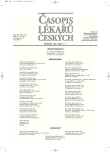-
Medical journals
- Career
Lower Dyspeptic Syndrome Recommended Diagnostic and Therapeutic Practice for General Practitioners 2006
Authors: B. Seifert; K. Lukáš 1; E. Charvátová 2; J. Vojtíšková 3; T. Koudelka 4; A. Hep 1; J. Bureš 1; V. Jirásek 1; Petr Dítě 1
Authors‘ workplace: Společnost všeobecného lékařství ČLS JEP, Praha ; Česká gastroenterologická společnost ČLS JEP 1; Katedra všeobecného lékařství IPVZ, Praha 2; Ústav všeobecného lékařství 1. LF UK, Praha 3; Ordinace praktického lékaře, Žirovnice 4
Published in: Čas. Lék. čes. 2007; 146: 17-23
Category: Review Article
Overview
Lower dyspeptic syndrome is a bowel disease manifesting namely with pain or sensation of abdominal discomfort and bowel movement problems (changes in the frequency and stool consistency). Symptoms include sensation of intraabdominal pressure and fullness, diarrhoea (with or without pain), sensation of incomplete defecation, constipation or bowel movement problems (with or without pain), irregular stool, collywobbles and bowel content flow (borborygia with spasms), meteorism, flatulency. Prevalence of the Irritable Bowel Syndrome in the European population is estimated to be 5 to 25 %. In the Czech Republic the total prevalence of dyspepsias is about 13 %. To the pathogenesis of the lower dyspeptic syndrome contribute: 1. abnormal motility, 2. abnormal visceral perception, 3. psychosocial factors, 4. luminal factors, 5. imbalance of neurotransmitters and/or intestinal bacteria and 6. possible inflammatory changes of the intestinal mucosa. Infectious diarrhoea is one of the causes. Functional bowel defects represent various combinations of chronic and recurrent symptoms from the digestive tract which cannot be explained by structural or biochemical abnormalities. Irritable bowel syndrome is a functional defect manifesting with abdominal pain, intestinal dyspepsia and compulsive defecations. Subtypes with typical symptomatology are characterized by circumstances which bring about pain and compulsive defecations (morning fractional defecation, postprandial defecation, debacles). Functional diarrhoea manifests with diarrhoea without intensive pain. Spastic obstipation manifests by abdominal pain, obstipation, compulsive defecations are absent, stool is cloddish, fragmented by spastic haustration, or it has a ribbon-form. Changes in the intestinal chemism include fermentative and putrefactive dyspepsia. Among the incomplete and atypical forms the isolated meteorism, irregular defecation, flatulency, abdominal pain – syndrome of the left or right epigastium or the syndrome of the right hypogastrium can be included. In patients with typical set of symptoms the working diagnose of the lower dyspeptic syndrome can be done by general practitioner. Complete history of the disease can reveal possible extra abdominal cause of dyspepsia, recognise alarming symptoms and consider circumstances elevating or lowering the probability of functional problems. Functional bowel problems have usually long-term character and represent clinically demanding challenge. Only few therapeutic regimens are successful and the therapy aimed at the abolishment of one symptom need not bring general improvement. For the clinical studies of the therapy of functional bowel problems significant placebo effect is typical. Quoad vitam prognosis is good, quoad sanationem it is rather doubtful.
Key words:
lower dyspeptic syndrome, irritable bowel syndrome, diarrhoea, obstipation.
Labels
Addictology Allergology and clinical immunology Angiology Audiology Clinical biochemistry Dermatology & STDs Paediatric gastroenterology Paediatric surgery Paediatric cardiology Paediatric neurology Paediatric ENT Paediatric psychiatry Paediatric rheumatology Diabetology Pharmacy Vascular surgery Pain management Dental Hygienist
Article was published inJournal of Czech Physicians

-
All articles in this issue
- Needfulness and Mission of Health Edu
- To the Fourties Anniversary of the Pancreatic Transplantation
- Lower Dyspeptic Syndrome Recommended Diagnostic and Therapeutic Practice for General Practitioners 2006
- Effect of Hypolipidemic Treatment on the Composition of Bile and the Risk or Cholesterol Gallstone Disease
- Orthopaedic Treatment of Osteolytic Lesions in Long Bones of Multiple Myeloma Patients
- Postoperative Pulmonary Thromboembolism and Nosocomial Pneumonias: Differential Diagnosis
- Prognostic Impact of Matrix Metalloproteinases 2,9, and 11 in Stromal Cells Stage I Non-small Cell Lung Cancer
- Cardiac Surgery Operations and Their Influence on Serum Level of Antiinflammatory Cytokine Interleukin-10
- Cohort of Lymphedema Patients Followed at the Lymphology Centre of the Dermatovenerologcal Clinic of the 2nd Faculty of Medicine University Hospital Na Bulovce Prague in Years 2000 to 2005 A Retrospective Study
- The p53 Positivity in Non-tumor Mucosa in Patients with Superficial Urinary Bladder Cancer
- HIV/AIDS and Pathology in Blood Count
- Incidence of Hiatal Hernias in the Current Endoscopic Praxis
- A Rare Complication of Acute Lymphoblastic Leukaemia in Young Patients
- Incidence of Delirium Tremens in the Czech Republic: A Rapid Increase
- Journal of Czech Physicians
- Journal archive
- Current issue
- Online only
- About the journal
Most read in this issue- Lower Dyspeptic Syndrome Recommended Diagnostic and Therapeutic Practice for General Practitioners 2006
- HIV/AIDS and Pathology in Blood Count
- Incidence of Hiatal Hernias in the Current Endoscopic Praxis
- Postoperative Pulmonary Thromboembolism and Nosocomial Pneumonias: Differential Diagnosis
Login#ADS_BOTTOM_SCRIPTS#Forgotten passwordEnter the email address that you registered with. We will send you instructions on how to set a new password.
- Career

